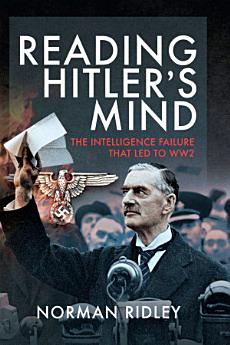Reading Hitler's Mind: The Intelligence Failure that led to WW2
Jul 2022 · Frontline Books
Ebook
240
Pages
family_home
Eligible
info
reportRatings and reviews aren’t verified Learn More
About this ebook
Most strongly associated with Prime Minister Neville Chamberlain, it is often stated that Britain’s policy of appeasement was instituted in the 1930s in the hope of avoiding war with Hitler’s Nazi Germany. At the time, appeasement was viewed by many as a popular and seemingly pragmatic policy.
In this book the author sets out to show how appeasement was not a naïve attempt to secure a lasting peace by resolving German grievances, but a means of buying time for rearmament. By the middle of the 1930s, British policy was based on the presumption that the balance of power had already dramatically shifted in Germany’s favour. It was felt that Britain, chiefly for economic reasons, was unable to restore the balance, and that extensive concessions to Germany would not satisfy Hitler, whose aggressive policies intensified the already high risk of war..
The only realistic option, and one that was clearly adopted by Neville Chamberlain, was to try to influence the timing of the inevitable military confrontation and, in the meantime, pursue a steady and economically sustainable program of rearmament. Appeasement would ‘buy’ that time for the British government.
Crucially this strategy required continuously updated and accurate information about the strength, current and future, of the German armed forces, especially the Luftwaffe, and an understanding of their military strategy. Piercing the Nazis’ veil of secrecy was vital if the intelligence services were to build up a true picture of the extent of German rearmament and the purposes to which it might be put.
The many agents, codebreakers, and counter-espionage personnel played a vital role in maximising the benefits that appeasement provided – even as war clouds continued to gather. These individuals were increasingly handed greater responsibility in a bid to inform British statesmen now scrambling to prepare for a catastrophic confrontation with Germany.
In Reading Hitler’s Mind, Norman Ridley reveals the remarkable efforts made by the tiny, underfunded and often side-lined British intelligence services as they sought to inform those whose role it was to make decisions upon which the wheels of history turned.
In this book the author sets out to show how appeasement was not a naïve attempt to secure a lasting peace by resolving German grievances, but a means of buying time for rearmament. By the middle of the 1930s, British policy was based on the presumption that the balance of power had already dramatically shifted in Germany’s favour. It was felt that Britain, chiefly for economic reasons, was unable to restore the balance, and that extensive concessions to Germany would not satisfy Hitler, whose aggressive policies intensified the already high risk of war..
The only realistic option, and one that was clearly adopted by Neville Chamberlain, was to try to influence the timing of the inevitable military confrontation and, in the meantime, pursue a steady and economically sustainable program of rearmament. Appeasement would ‘buy’ that time for the British government.
Crucially this strategy required continuously updated and accurate information about the strength, current and future, of the German armed forces, especially the Luftwaffe, and an understanding of their military strategy. Piercing the Nazis’ veil of secrecy was vital if the intelligence services were to build up a true picture of the extent of German rearmament and the purposes to which it might be put.
The many agents, codebreakers, and counter-espionage personnel played a vital role in maximising the benefits that appeasement provided – even as war clouds continued to gather. These individuals were increasingly handed greater responsibility in a bid to inform British statesmen now scrambling to prepare for a catastrophic confrontation with Germany.
In Reading Hitler’s Mind, Norman Ridley reveals the remarkable efforts made by the tiny, underfunded and often side-lined British intelligence services as they sought to inform those whose role it was to make decisions upon which the wheels of history turned.
About the author
Norman Ridley is an Open University Honours graduate and a writer on inter-war intelligence. He lives in the Channel Islands.
Rate this ebook
Tell us what you think.
Reading information
Smartphones and tablets
Install the Google Play Books app for Android and iPad/iPhone. It syncs automatically with your account and allows you to read online or offline wherever you are.
Laptops and computers
You can listen to audiobooks purchased on Google Play using your computer's web browser.
eReaders and other devices
To read on e-ink devices like Kobo eReaders, you'll need to download a file and transfer it to your device. Follow the detailed Help Center instructions to transfer the files to supported eReaders.







